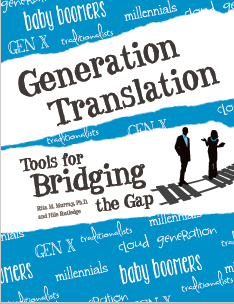In your most formative years (between 10 and 20 years old), how present was the assumption that you would one day do better financially/materially than your parents?
This is a question I routinely ask people in my Generation Translation training, for it tends to produce different and illustrative answers from each generation. At a client-site training held recently, the question not only produced the expected replies, but it triggered a vigorous and pointed exchange between a Baby Boomer and a Millennial that quickly grew to a clash of their respective generational groups. It was a fortuitous teaching moment, and it highlighted one of the many heated tensions between these two generations.
 A Baby Boomer (born between 1946 and 1964) participant said, with unanimous assent from her fellow Boomers, that there was a clear and often stated belief when growing up that she would do better and have more than her parents. Making this goal a reality had been a motivating force in her education, professional development and a driving work ethic for as long as she could remember. Life is an effort, a challenge, a race—and running it well and vigorously had always been expected by others and embraced by her. Doing well financially and materially was a natural by-product of both her hard work and the serious approach she took to achievement. While one person voiced this sentiment, the other Boomers supported her with a streaming chorus of “amens”.
A Baby Boomer (born between 1946 and 1964) participant said, with unanimous assent from her fellow Boomers, that there was a clear and often stated belief when growing up that she would do better and have more than her parents. Making this goal a reality had been a motivating force in her education, professional development and a driving work ethic for as long as she could remember. Life is an effort, a challenge, a race—and running it well and vigorously had always been expected by others and embraced by her. Doing well financially and materially was a natural by-product of both her hard work and the serious approach she took to achievement. While one person voiced this sentiment, the other Boomers supported her with a streaming chorus of “amens”.
The Millennial (born between 1981 and 2000) very casually said, “I suppose there was a belief that I would do better than my parents, but that is not a goal I necessarily share.” The Millennial went on say that she had friends, interests, and community-rooted values that often felt at odds with the more material-focused and achievement-driven lives that her parents lived, and that the question itself (about doing better than your parents) was not as resonant as it seemed to have been with the Boomers. Most of the Millennials agreed with this statement.
Whereas the Millennials found the generational difference in the two groups’ responses merely interesting, the Boomers—found it more troubling, and the original speaker for the Boomers actually found it offensive.
The Boomer’s Perspective
The Boomer participant had a Millennial child—now a college graduate in his twenties—still living at home, and while there was no power differential or authority difference between the Boomer and Millennial colleagues within this working group, it was hard for the Boomer NOT to see her son when she engaged the Millennials in this discussion.
After a lifetime and long career of effort, toil and sacrifice, the Boomer has a vision of running a race that will culminate in the handing off of the baton to a protégé/colleague who has been groomed to drive on, fight the fight and maintain the race as established. It is disappointing at best—and violating at worst—to have the generation that was to take that baton decide that the race may not need to be run—that there may not even be a race!
Lazy & uncommitted—Boomers often see the Millennials’ lack of drive and achievement scripts as uncommitted and even lazy.
Immature & short-sighted—Boomers can believe that Millennials’ lack of drive and intense engagement with work is merely a delay in what is and should be their natural development.
Ungrateful—The Boomer in my training resented her Millennial colleague—and the entire generation by association—for her not wanting to step up and engage her work role the way that she (the Boomer) believed she should have. Many Boomers believe Millennials are free to choose whether or not to engage and compete only because they have been afforded a life of such comfort and protection from the Boomers—parents, teachers and bosses—who came before them. Within this view, Millennials look spoiled, entitled and ungrateful NOT to now pay their dues with hard work and dedicated effort.
 The Millennial’s Perspective
The Millennial’s Perspective
The Millennial participant did not still live with her parents and did not appreciate being treated—because of her age—as subordinate to her Boomer colleague, whose intensity she found surprising and off-putting.
The Millennial had had an upbringing wherein she had constant access to praise, media, and support from those in power around her (teachers, parents, and coaches)—she did not have to toil and sweat to be and feel successful. She already was. She joined the organization with multiple degrees—more formal education, in fact, than the Boomer colleague with whom she had gotten into the verbal scrum.
Imbalanced & myopic—Millennials tend to have had a life rich with group and team experiences, familial connection and an active social media network. In the lives of many Millennials, the Boomers’ intense work-focus is at the expense of these other life-balancing relationships and activities.
Overly controlling—While Boomers have often been in the workplace for more years, Millennials are, as a group, well-educated and technologically current—ready to jump in, contribute, and quickly move along in the organization’s structure, not simply to get in line and to wait your turn.
Condescending—The Millennial in my training was put-off by her Boomer colleague’s attitude—by the older’s assumption that “you are not like me, but when you grow up, you will be.” This is not how colleagues—how peers—should speak to each other.
This clash of generations, viewpoints and opinions is only going to increase in frequency as the Boomers remain in the workforce and Millennials continue to join it—the youngest Millennial is still in high school. Anticipating these clashes and being able to see both points of view and find the middle ground are among the new challenges we face in our workplaces today.

Generation Translation: Tools for Bridging the Gap, OKA’s newest book and training approach, describes each generation and their work styles in great detail and then offers a number of exercises, tips and suggestions for how to engage, understand and even motivate each generation. Click the image to learn more about Generation Translation, purchase the workbook or attend the upcoming one-day training at OKA. OKA can also come to you! If you are interested in a Generation Translation workshop for your team, please e-mail Harris Fanaroff, OKA’s Business Development Director, at hfanaroff@oka-online.com.

Hile,
Interesting verbal exchange and analysis. I see it played out almost daily in the workplace and in most other venues. You and Rita have nailed it in your book and, as I tell Rita, it can and will help collaboration IF the recipients take it seriously and show respect for the other generation and find a way to communicate without contention. I really enjoy your writing and insights, as I do Rita’s. You guys can make a very positive mark in the lives of all generations if only they hear your words and act positively on them.
Obviously, the ultimate answer it that all generations comply with the Traditionalist view and commands!! 🙂
Blessings,
Ron
Thank you for this insight and perspective. However as a boomer I am finding I identify increasingly with the Millennial point of view. The more I read of the ” traditional boomer” perspective the greater the alienation I feel from my own generational group.
This could explain why for much of my working life I have felt an outsider with values and views not shared by my colleagues. Also why I have and continue to find it difficult to fit in to many organizations and workplaces.
I love and enjoy my Milleennial connections and friendships, and I find them refreshing, exciting and relevant.
I wonder if the Boomer attitude you encountered was also reflective of the type of organization in which you were working?
Hey Karen,
While birth year drives these groupings and foretells these behavioral tendencies, there are exceptions, and I see/experience them all the time. I’ve worked with a couple of Millennials who were raised by Traditionalist grandparents. This gave these Millennials–while still Millennials–a distinctively different flavor. My wife is a Gen-Xer, but she grew up with four older siblings–all Boomers. Her experience is, of course, a bit different from the average Gen-Xer.
When I do experiential training, I first have people explore their generation grouped tightly by birth-year, but on all subsequent exercises, I have people go the generational group with which they feel most connection. I have, invariably, Gen-Xers identify as Millennials and Boomers connect more with Gen-X. This is a uniqueness of your own development, and I appreciate your bringing it up.